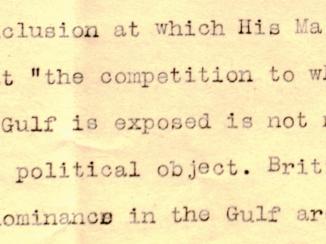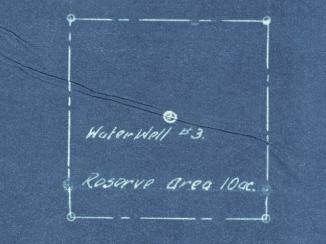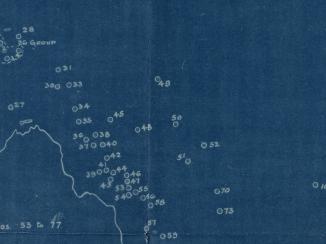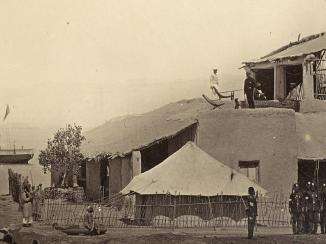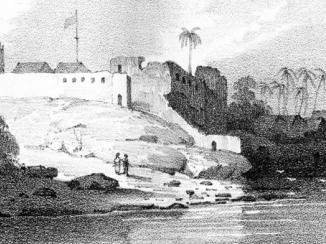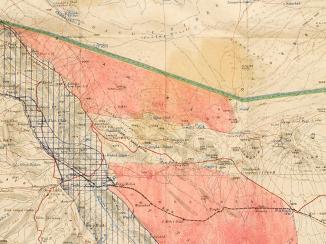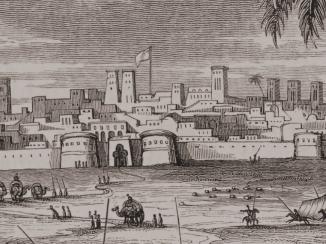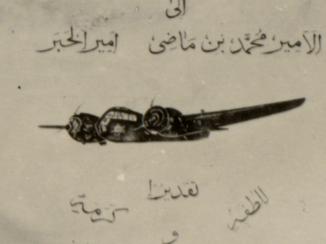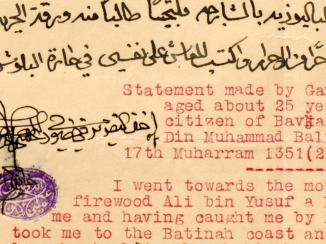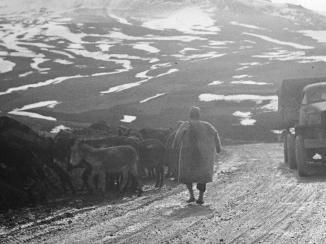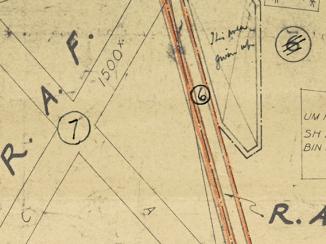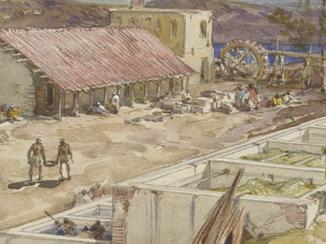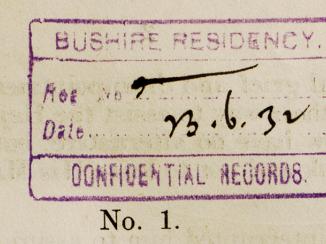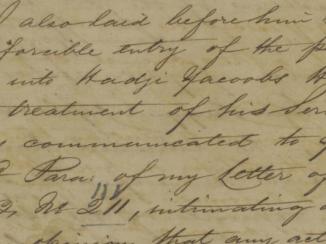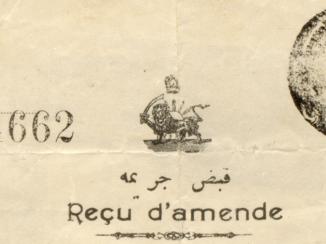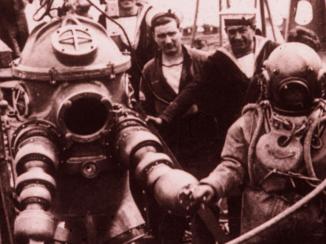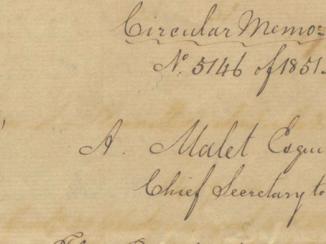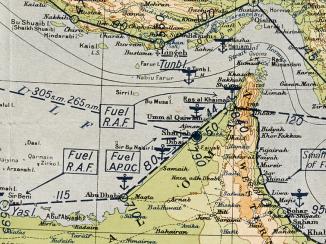Overview
Throughout the first half of the twentieth century, Britain’s Resident at Bushire was called upon to adjudicate on numerous requests from slaves on the Arabian coast of the Gulf, who had submitted manumission requests at the region’s Political Agencies. The numbers of manumission statements processed each year reached a peak during the 1930s.
The majority of the cases relate to pearl divers from the Trucial Coast A name used by Britain from the nineteenth century to 1971 to refer to the present-day United Arab Emirates. , complaining of the inadequate provisions given to them by their owners.
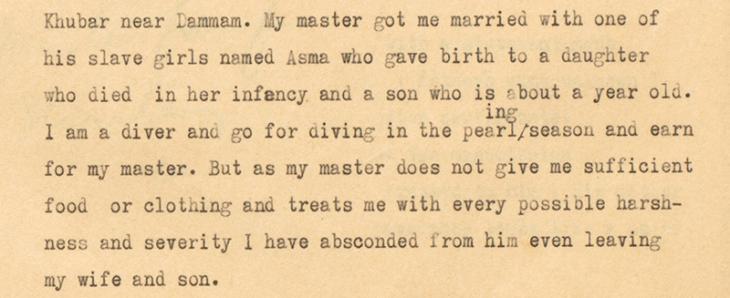
Setbacks in the Pearling Industry
The primary reason that lay behind the large numbers of pearl divers seeking manumission – and the reasons divers gave for their having absconded from their work – lay in the precarious state of the Gulf’s pearling industry at the time, which had been decimated by a series of catastrophic events. Two decades previously, the First World War had precipitated a drop in the global demand for pearls. This setback was followed in the 1920s by the increasing availability of cheaper, cultured pearls from Japan, an innovation that the British Government was reluctant to introduce into the Gulf.
The global financial crash of 1929 was a disaster from which the Gulf’s pearling industry would never fully recover. The consequence of the terminal decline in demand for Gulf pearls was that the inhabitants of the Trucial Coast A name used by Britain from the nineteenth century to 1971 to refer to the present-day United Arab Emirates. states, whose livelihood was almost entirely dependent on an industry built on precarious economic foundations, fell into a profound state of poverty.
Indebted and Indentured Labourers
As the industry’s profit margins were squeezed, the negative effects were felt most keenly by the divers and pullers working on the pearling dhows. Most of these men, a mix of African, Asian, Indian and Arab descent, were not slaves in the most commonly understood sense of the word, that is, chattels, who were actually owned.
These men were, however, what we would now regard as indentured labourers. They were dependent upon their employers, the nakhudas (pearling boat captains) for financial advances; not only to pay for their provisions during the season, but in many cases to sustain them through the winter as well. Such a system never worked to the benefit of the pearl divers, but from the mid-1920s onwards, as the profitability of the pearling industry declined, it meant that pearl divers found themselves faced with debts that did not diminish, but increased one year after the next.
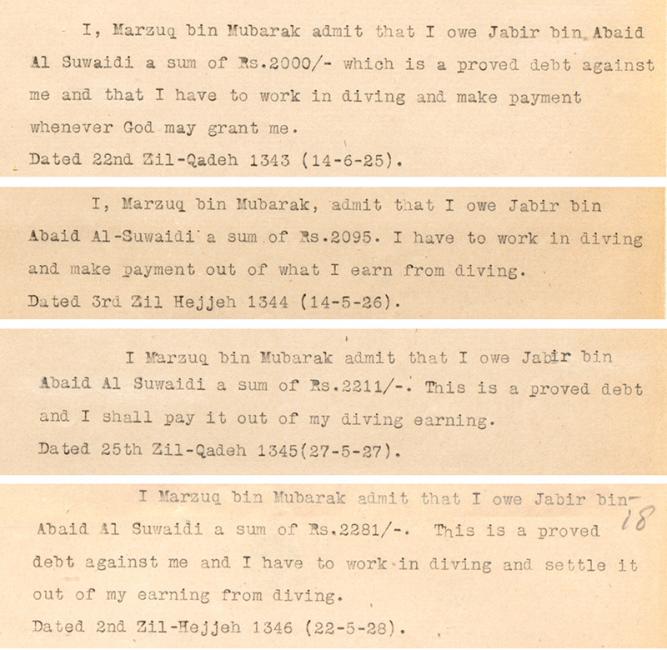
The manumission statements in the India Office The department of the British Government to which the Government of India reported between 1858 and 1947. The successor to the Court of Directors. Records suggest that, as the profitability of the pearling industry declined from the First World War onwards, divers became increasingly dissatisfied with the provisions given to them by their captains. ‘Insufficient food and clothing’ is the stock phrase agency An office of the East India Company and, later, of the British Raj, headed by an agent. staff used in the manumission statements.
The British Response
For their part, the British were uncomfortable with the idea of manumitting indentured pearl divers. ‘The whole fabric of the pearling industry’ noted the Deputy Political Resident A senior ranking political representative (equivalent to a Consul General) from the diplomatic corps of the Government of India or one of its subordinate provincial governments, in charge of a Political Residency. to the Persian Gulf The historical term used to describe the body of water between the Arabian Peninsula and Iran. in 1917, ‘will collapse if any diver when he gets badly in debt can run away and escape his liabilities by the simple process of saying he is a slave’. In 1918, responding to the increasing numbers of disputes between divers, pearling dhow A term adopted by British officials to refer to local sailing vessels in the western Indian Ocean. captains and merchants, the British authorities drew up a set of guidelines for Political Agents, to help them arbitrate in the disputes between divers and their captains.
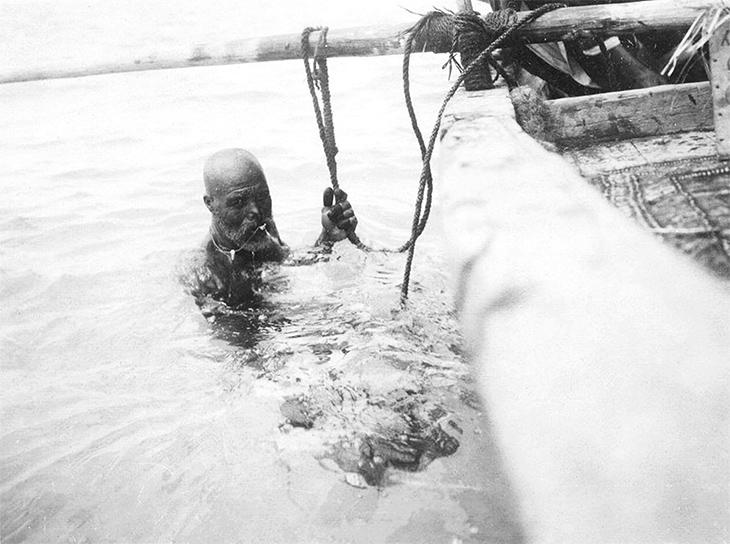
Freedom or Slavery?
British officials’ attempts at arbitration and reform in the Gulf’s pearl industry did little to help the lot of the pearl divers, and as the Depression continued to bite into the mid-1930s, the perspectives of slaves and owners changed markedly. In January 1936, the Political Agent A mid-ranking political representative (equivalent to a Consul) from the diplomatic corps of the Government of India or one of its subordinate provincial governments, in charge of a Political Agency. at Bahrain, Percy Loch, wrote to the Political Resident A senior ranking political representative (equivalent to a Consul General) from the diplomatic corps of the Government of India or one of its subordinate provincial governments, in charge of a Political Residency. in Bushire, Trenchard Fowle, describing the current situation in Bahrain. ‘A somewhat extraordinary state of affairs has been brought about by the financial depression and fall in the value of pearls’ he wrote.
Loch described how slave owners, who had hitherto sent their slaves out to work on the pearling dhows each summer, were eager to dispose of what they now regarded as an economic liability, even if it meant making a loss on their investment. Loch noted that the slaves themselves ‘do not […] mind much where they go, so long as they have an owner who feeds and clothes them’, adding that born slaves were ‘anxious to remain as slaves’.
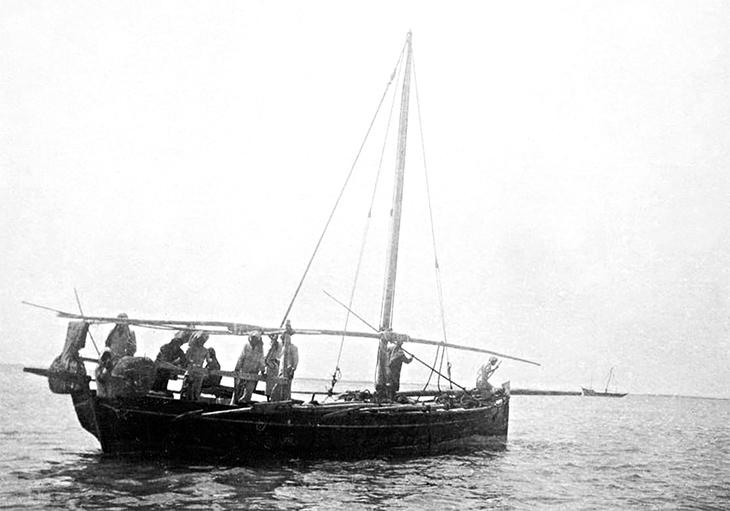
While the Arab coast’s pearling industry lay in the doldrums, the region’s embryonic oil industry was slowly gathering pace. Throughout the mid-to-late 1930s, a small but growing number of slaves seeking manumission from British officials described themselves as oil company labourers, suggesting that a few of the more entrepreneurial slave owners had redeployed their slaves to a more profitable economic activity. In Bahrain, Qatar and along the Arab coast, pearl divers started to seek new opportunities with the oil companies, who required manual labour to help build their infrastructure.



